Baroness Casey's audit of group-based child sexual exploitation and abuse
The Home Secretary updated the House on the National Audit on Group-based Child Sexual Exploitation and Abuse ('grooming gangs') carried out by Baroness Casey.
Mr Speaker, with your permission, I will update the House on the audit the government commissioned from Baroness Casey on child sexual exploitation and grooming gangs, and on the action we are taking to tackle this vile crime – to put perpetrators behind bars, and to provide the innocent victims of those crimes with support and justice.
The House will be aware that on Friday, 7 men were found guilty of the most horrendous crimes in Rochdale between 2000 and 2006.
They were convicted of treating teenage girls as sex slaves – repeatedly raping them in filthy flats, alleyways and warehouses. The perpetrators included taxi drivers and market traders of Pakistani heritage, and it has taken 20 years to bring them to justice.
I want to pay tribute to the incredible bravery of the women who told their stories and have fought for justice through all those years. They should never have been let down for so long.
The sexual exploitation of children by grooming gangs is one of the most horrific crimes.
Children as young as 10 plied with drugs and alcohol, brutally raped by gangs of men and disgracefully let down again and again by the authorities who were meant to protect them and keep them safe.
These despicable crimes have caused the most unimaginable harm to victims and survivors throughout their lives and are a stain on our society.
Five months ago, I told the House our most important task was to stop perpetrators and put them behind bars.
I can report that that work is accelerating.
Arrests and investigations are increasing.
After I asked police forces in January to identify cases involving grooming and child sexual exploitation allegations that had been closed with no further action, more than 800 cases have now been identified for formal review.
And I expect that figure to rise above 1,000 in the coming weeks.
Let me be clear. Perpetrators of these vile crimes should be off our streets, behind bars and paying the price for what they have done.
Further rapid action is also under way to finally implement recommendations of past inquiries and reviews – including the 7-year Independent Inquiry into Child Abuse – recommendations which for too long have sat on the shelf.
So in the Crime and Policing Bill, we are introducing:
The long overdue mandatory reporting duty which I called for more than 10 years ago.
As well as aggravated offences for grooming offenders so their sentences match the severity of their crimes.
And earlier this year, I also commissioned Baroness Louise Casey to undertake a rapid national audit of the nature, scale and characteristics of gang-based exploitation.
I specifically asked her to look at the issue of ethnicity, and the cultural and social drivers for this type of offending – analysis that had never previously been done despite years of concerns being raised.
And I asked her to advise us on what further reviews, investigations and actions would be needed to address the current and historical failures that she found.
I told Parliament in January that I expected Baroness Casey to deliver the same kind of impactful and no-holds-barred report that she produced on Rotherham in 2015 so we never shy away from the reality of these terrible crimes.
And I am very grateful to Louise and her team that they have done exactly that, with a hugely wide-ranging assessment conducted in just 4 months.
The findings of her audit are damning.
At its heart she identifies a deep-rooted failure to treat children as children. A continued failure to protect children and teenage girls from rape, from exploitation, and serious violence. And from the scars that last a lifetime.
She finds too much fragmentation in the authorities’ response, too little sharing of information, too much reliance on flawed data, too much denial, too little justice, too many criminals getting off, too many victims being let down.
The audit describes;
victims as young as 10 – often those in care, or children with learning or physical disabilities – being singled out for grooming precisely because of their vulnerability
perpetrators still walking free because no one joined the dots or because the law ended up protecting them instead of the victims that they had exploited
deep rooted institutional failures, stretching back decades, where organisations who should have protected children and punished offenders looked the other way - and Baroness Casey found “blindness, ignorance, prejudice, defensiveness and even good but misdirected intentions” all played a part in this collective failure
But on the key issues of ethnicity that I had asked her to examine, she has found continued failure to gather proper robust national data, despite concerns being raised going back very many years. In the local data that the audit examined from 3 police forces they identify clear evidence of over-representation among suspects of Asian and Pakistani-heritage men. And she refers to “examples of organisations avoiding the topic altogether for fear of appearing racist or raising community tensions”.
Mr Speaker, these findings are deeply disturbing.
But most disturbing of all, as Baroness Casey makes clear, is the fact that too many of these findings are not new.
As her audit sets out, there have been 15 years of reports, reviews, inquiries and investigations into these appalling rapes, exploitation and violent crimes against children – detailed over 17 pages in her report – but too little has changed.
We have lost more than a decade. That must end now.
Baroness Casey sets out 12 recommendations for change. We will take action on all of them immediately.
Because we cannot afford more wasted years so we will introduce:
new laws to protect children and support victims so they stop being blamed for the appalling crimes committed against them
new major police operations to pursue perpetrators and put them behind bars
a new national inquiry to direct local investigations and hold institutions to account for past failures
new ethnicity data and research so we face up to the facts on exploitation and abuse
new action across children’s services and other agencies to identify children at risk
and further action to support child victims and tackle new forms of exploitation and abuse online
Taken together, this will mark the biggest programme of work ever pursued to root out the scourge of grooming gangs and child sexual exploitation.
Those vile perpetrators who have grown used to the authorities looking the other way must have no place to hide.
So let me spell out the next steps we are announcing today.
Baroness Casey’s first recommendation is that we must see children as children.
She concludes that too many grooming cases have been dropped or downgraded from rape to lesser charges because a 13 to 15-year-old is perceived to have been ‘in love with’ or ‘had consented to’ sex with the perpetrator.
So we will change the law to ensure that adults who engage in penetrative sex with a child under 16 face the most serious charge of rape, and we will work closely with the CPS [Crown Prosecution Service] and the police to ensure there are safeguards for consensual teenage relationships.
And we will change the law so that those convicted for child prostitution offences while their rapists got off scot-free will have their convictions disregarded and their criminal records expunged.
Baroness Casey’s next recommendation is a national criminal operation.
As I have set out, arrests and investigations are rising.
But the audit recommends us going further
So I can announce that the police will launch a new national criminal operation into grooming gangs, overseen by the National Crime Agency bringing together for the first time all arms of the policing response and will develop a rigorous new national operating model which all forces across the country will be able to adopt.
Ensuring grooming gangs are always treated as serious and organised crime.
So rapists who groom children whether their crimes were committed decades ago or are still being committed today can end up behind bars.
But alongside justice there must also be accountability and action.
We have begun implementing the recommendations from inquiries past, including Professor Jay’s Independent Inquiry.
And we have said that further inquiries are needed to get accountability in local areas.
I told the House in January I would undertake further work to look at how to ensure those inquiries could get the evidence they needed to properly hold institutions to account and we have sought responses from local councils too.
We asked Baroness Casey to review those responses, as well as the arrangements and powers that had been used in past investigations and inquiries, to consider the best means to get to the truth.
Her report concludes that further local investigations are needed but that they should be directed and overseen by a national commission with statutory inquiry powers.
We agree. And we will set up a national inquiry to that effect.
Baroness Casey is not recommending another over-arching inquiry of the kind conducted by Professor Alexis Jay and she recommends that the inquiry should be time limited.
But its purpose must be to challenge what the audit describes as continued denial, resistance and legal wrangling among local agencies, and we will set out the further details on the national inquiry in due course.
Mr Speaker, I warned in January that the data collection we had inherited from the previous government on ethnicity was completely inadequate. That data was only collected on 37% of suspects.
Baroness Casey’s audit confirms that ethnicity data is not recorded for two-thirds of grooming gang perpetrators – and she says it is “not good enough to support any statements about the ethnicity of group-based child sexual exploitation offenders at the national level”. I agree with that conclusion.
Frankly it is ridiculous and helps no one that this basic information is not collected – especially when there have been warnings and recommendations stretching back 13 years about the woefully inadequate data on perpetrators which prevents patterns of crime being understood and tackled.
The immediate changes I announced in January to police recording practices are starting to improve the data, but we will need to go much further.
Baroness Casey’s audit examined local level data in 3 police force areas. Greater Manchester, West Yorkshire and South Yorkshire where high profile cases involving Pakistani-heritage men have long been investigated and reported – and there they found the suspects of group-based child sexual offences were disproportionately likely to be Asian men.
She also found indications of disproportionality in serious case reviews.
While much more robust national data is needed, we cannot and must not shy away from these findings. Because as Baroness Casey says: “ignoring the issues, not examining and exposing them to the light, allows the criminality and depravity of a minority of men to be used to marginalise whole communities.”
The vast majority of people in our British Asian and Pakistani heritage communities continue to be appalled by these terrible crimes and they agree that the criminal minority of sick predators and perpetrators in every community must be dealt with robustly by the criminal law.
Baroness Casey’s review also identifies prosecutions and investigations into perpetrators who are White British, European, African or Middle Eastern, just as Alexis Jay’s Inquiry concluded that all ethnicities and communities were involved in appalling child abuse crimes.
So to provide accurate information to help tackle serious crimes we will make it a formal requirement for the first time to collect both ethnicity and nationality data for all cases of child sexual abuse and exploitation.
And we will commission new research into the cultural and social drivers of child sexual exploitation, misogyny and violence against women and girls, as Baroness Casey has recommended.
The final group of recommendations from the audit is about the continued failure of agencies that should be keeping children safe to share vital information or act on clear signs of risk.
Worryingly the audit finds that whilst reports of child sexual abuse and exploitation to the police have gone up, the number of child sexual abuse cases identified for protection plans by local children’s services has fallen to its lowest ever level. But no one has been curious as to why
And the audit details an abysmal failure to respond to 15 years’ worth of recommendations and warnings about the failings of inter-agency co-operation.
So we will act at pace to deliver on Baroness Casey’s recommendations on mandatory sharing of information between agencies and on unique reference numbers for children, the work already being taken forward by my Right Honourable Friend the Education Secretary.
And my Right Honourable Friend the Transport Secretary will also work at pace to close loopholes in the law on taxi licensing.
Finally, I want to respond to 3 other important issues identified by Baroness Casey in her report but where she has not made specific recommendations.
On support for victims, my Right Honourable Friend the Health Secretary will fund additional training for mental health staff in schools on identifying and supporting children and young people who have experienced trauma, exploitation and abuse.
Secondly. Baroness Casey reports that she came across cases involving suspects who were asylum seekers. We have asked her team to provide to the Home Office all the evidence that they found, so that Immigration Enforcement can immediately pursue individual cases with the police.
But let me make clear. Those who groom children or commit sexual offences will not be granted asylum in the UK. We will do everything in our power to remove them. I do not believe the law is strong enough, that we have inherited, so we are bringing forward a change to the law, so that anyone convicted of sexual offences is excluded from the asylum system and denied refugee status.
We have already increased the removal of foreign national offenders by 14% since the election and we are drawing up new arrangements to identify and remove those who have committed a much wider range of offences.
Finally, Baroness Casey describes ways in which patterns of grooming gang child sexual exploitation are changing.
Including evidence of rape and sexual exploitation taking place in street gangs and drug gangs, that combine criminal and sexual exploitation.
I do not believe that this kind of exploitation has been sufficiently investigated.
It also describes sexual exploitation in modern slavery and trafficking cases.
And most significant of all it describes the huge increase in online grooming and horrendous sexual exploitation and abuse – including the use of social media apps to build up relationships and lure children into physical abuse.
The audit quotes one police expert saying, “If Rotherham were to happen again today it would start online.”
Mr Speaker, we are also passing world-leading new laws to target those who groom and exploit children online and investing in cutting edge technology to target the highest-harm offenders but we will need to do much more or the new scandals and shameful crimes of the future will be missed.
When the final report of Alexis Jay’s 7-year national inquiry was published in October 2022, the then Home Secretary, Grant Shapps, issued a profound and formal public apology to the victims of child sexual abuse so badly let down over decades by different levels of the state.
As Shadow Home Secretary at that time I joined him in that apology on behalf of the Opposition and extended it to victims of child sexual exploitation too.
To the victims and survivors of sexual exploitation and grooming gangs, on behalf of this and past governments and the many public authorities who let you down, I want to reiterate an unequivocal apology for the unimaginable pain and suffering you have suffered and the failure of our country’s institutions through decades to prevent that harm and keep you safe.
But words are not enough. Victims and survivors need action.
The reforms I have set out today will mean the strongest action any government has taken to tackle child sexual exploitation
More police investigations, more arrests, a new inquiry, changes to the law to protect children, and a fundamental overhaul of the way organisations work to support victims and put perpetrators behind bars.
But none of this will work unless everyone is part of it. Unless everyone works together to keep our children safe.
I commend this statement to the House.
List of UK Grooming Gangs that have been prosecuted:
Following on from the incredible speech from MP Katie Lam in the House of Commons, The Masked Truth decided to investigate how many UK grooming gangs have been prosecuted and how many are still out there. The information we provide is not exhaustive and there is definitely a lot more to discover about the UK grooming gangs and the cover ups by the Police, Local Councils and the Labour Government.
If you or anyone you know have been affected by the people highlighted in this article, then please report those individuals to the Police on 101 (999 if an emergency)
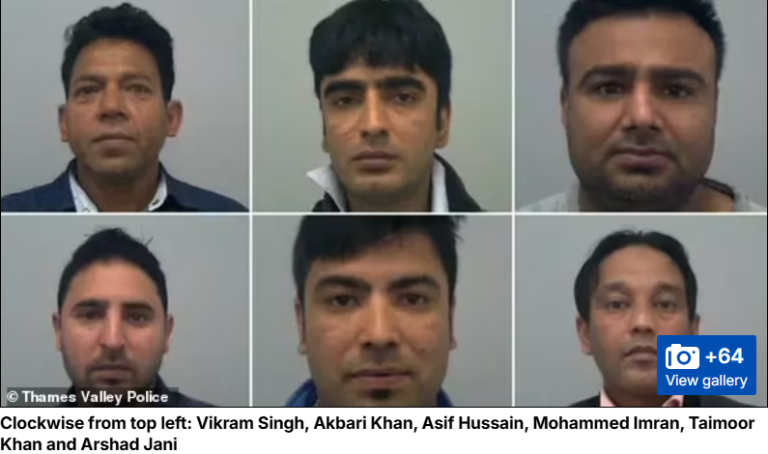
Aylesbury Grooming Gang
In 2015, a grooming group including six males was sentenced to a cumulative 82 years in prison for grooming and raping vulnerable girls, who were coerced into sexual acts in exchange for a ‘McDonald’s meal, a milkshake, and a cinema ticket.’
The heinous paedophile Aylesbury Grooming Gang, active from 2006 to 2012, involved numerous rapes of a child under 13, child prostitution, and the administration of a chemical to incapacitate a girl for the purpose of sexual exploitation.
On September 7, 2015, the nefarious Aylesbury Grooming Gang was ultimately held accountable. Vikram Singh, Asif Hussain, Arshad Jani, Mohammed Imran, Akbari Khan, and Taimoor Khan received prison sentences ranging from three years to nineteen and a half years.
The years of abuse made one victim – referred to only as Child A – feel as though she had been ‘robbed of her teenage years’.
By the time the vulnerable girl was 16, she had been abused by just under 70 men, having initially caught the eye of stall holders in Aylesbury market, taxi and bus drivers.
The relentless abuse made her feel ‘worthlessness’ as she battled depression and alcohol addiction. She told the court at the time: ‘I feel my teenage years were taken away from me.’
Most of the men from the group are likely to be free from jail now, if they were released half-way through their sentence – as is the case for around 90 per cent of criminals sent to jail.

Bradford Grooming Gang
A victim of a nine-member Bradford Grooming Gang, West Yorkshire, felt as though she was ‘merely a toy to manipulate’ after the perpetrators intoxicated her and sexually assaulted her at the age of 14.
On February 27, 2019, the reprehensible Bradford Grooming Gang was sentenced to a cumulative total of 132 years for grooming and abusing their adolescent victims, who were residing in a children’s home.
One of the victims described it as a case of ‘evident, resolute, and subtle grooming.’ The other victim recounted her experiences of PTSD, self-harm, and suicide attempts stemming from the assault.
Basharat Khaliq, Saeed Akhtar, Naveed Akhtar, Parvaze Ahmed, Izar Hussain, Zeeshan Ali, Kieran Harris, Fahim Iqbal and Mohammed Usman were all given sentences ranging from seven years to 20 years.
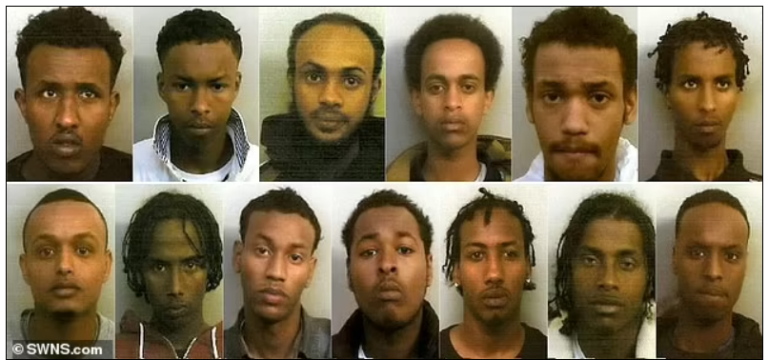
Bristol Grooming Gang
In Bristol, young girls in care became targets of a Somali prostitution network, with five victims aged between 13 and 17, two of whom were siblings, subjected to abuse.
In 2011, two Bristol City Grooming Gang members checked into a Premier Inn hotel and subsequently raped a 13-year-old schoolgirl three times.
Some of the girls were so severely groomed that they perceived the sexual abuse they endured as a normative aspect of affectionate relationships.
They were groomed to believe that having sex with their boyfriend’s friends was part of their ‘culture and tradition’.
The victims, described as ‘vulnerable’ due to their age and circumstances, were paid as little as £30 or given drugs, alcohol and gifts to perform sex acts on older men.
Abuse of one girl, which lasted a horrific five months, only ended when police entered a property after social workers raised concerns about the teenager.
There she was found crying in a cupboard under the kitchen sink wearing only her underwear, the court was told at the time.
A total of 13 men of the Bristol City Grooming Gang were convicted of charges including rape, sexual activity with a child, facilitating child prostitution, trafficking, paying for the sexual services of a child and drug offences.
Mustapha Farah, Liban Abdi, Arafat Osman, Abdulahi Aden, Mustafa Deira, Idleh Osman, Sakariah Sheik, Jusuf Abdirizak, Abdirashid Abdulahi, Omar Jumale and Mohamed Dahir were all handed jail terms between two and 13 years.

Coventry Grooming Gang
In a case on the Coventry Grooming Gang, a reprehensible group of five men utilised social media, specifically Facebook, to exploit their minor victims.
The nefarious Coventry Grooming Gang assaulted several young girls between 2015 and 2016.
The males, referred to as ‘despicable rodents’ by one girl’s uncle, targeted young, vulnerable individuals, including some in care.
In certain instances, the Coventry Grooming Gang transported the young girls to isolated locations in Coventry before administering drugs or alcohol to exploit or traffic them for sexual purposes.
In a distressing incident, a girl was rendered unconscious by one of the assailants. Upon regaining consciousness, she discovered them viewing a recording of her assault while she was incapacitated.
Waqaar Khan, Marcus Woolcock, Kadeem Bourne, Keenan Kelly, and Zahid Chaudhary, were convicted of 18 offences at Warwick Crown Court on January 26 2017.
The convictions included rape, sexual abuse and sex trafficking with the jail terms ranging from two years and six months to 14 years and six months.

Halifax Grooming Gang
A group of 15 males from the Halifax Grooming Gang, West Yorkshire, exploited two young girls from 2009 to 2011.
The majority of the abuse was focused on a single victim who was merely 13 years old when it commenced. The adolescent experienced a tumultuous household environment when the grooming commenced.
It is reported that she was ‘used like a sex toy’ by the gang during the two-year duration of the assault.
The maltreatment subsequently resulted in her addiction to drugs and alcohol, culminating in her placement into care when the assaults ceased in 2011.
The second victim was sexually abused in her vehicle.
Subsequent to three distinct trials, all fifteen men of the Halifax Grooming Gang were adjudicated on June 17, 2016. The minimum penalty was 15 months, while the maximum was 25 years, subsequent to what was characterised as a ‘lengthy and intricate’ police investigation.
The names of those in the 15-strong Halifax Grooming Gang are: Hedar Ali, Haider Ali, Khalid Zaman, Mohammed Ramzan, Tahir Mahmood, Taukeer Butt, Haaris Ahmed, Amaar Ali Ditta, Azeem Subhani, Talib Saddiq, Sikander Malik, Mohammed Ali Ahmed, Mansoor Akhtar, Sikander Ishaq and Fasil Mahmood.
Their crimes included rape, trafficking for sexual exploitation, sexual activity with a child, sexual assault and supplying Class B drugs.
In 2019, six members of the Halifax Grooming Gang tried to appeal their convictions but this was thrown out by a judge who said the victim’s ordeal ‘transcends the imagination of most people’.
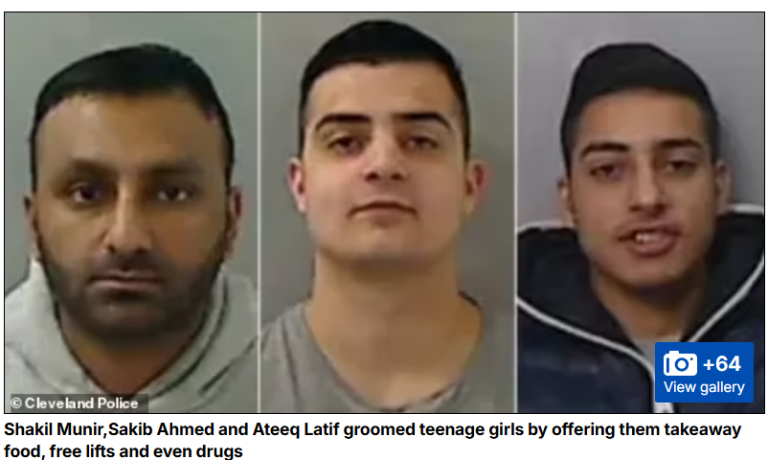
Middlesbrough Grooming
Victims in Middlesborough were left ‘scarred’ after being objectified for sexual gratification by a trio of child abusers from the Middlesbrough Grooming Gang.
Taxi driver Shakil Munir, Ateeq Latif, and pizza shop employee Sakib Ahmed exploited underage females by providing them with takeaway food, complimentary transportation and even narcotics.
On February 13, 2014, at Teesside Crown Court, Munir and Ahmed received eight-year prison sentences, while Latif was sentenced to three years in a young offenders’ institute. It signifies that all males from the Middlesbrough Grooming Gang ought to have been liberated from incarceration by this time and looking for new white girls to rape.
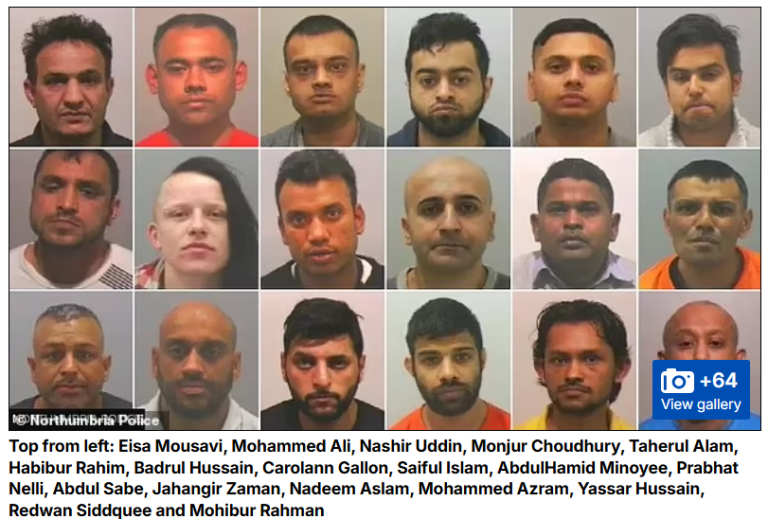
Newcastle Grooming Gang
From 2011 to 2014 in Newcastle, 20 young teenage girls were victimised by an 18-member Newcastle Grooming Gang.
The victims, predominantly from disadvantaged families and some as young as 14 years old, were frequently intoxicated with drugs and alcohol prior to being exploited.
Eighteen individuals from the Newcastle Grooming Gang – 17 males and one female – were convicted and received prison sentences, resulting in over 100 charges being filed.
The individuals, from the Newcastle Grooming Gang, prosecuted were primarily British-born members of the Bangladeshi, Pakistani, Indian, Iraqi, Iranian, and Turkish populations in Newcastle:
Eisa Mousavi, Mohammed Ali, Nashir Uddin, Monjur Choudhury, Taherul Alam, Habibur Rahim, Badrul Hussain, Carolann Gallon, Saiful Islam, AbdulHamid Minoyee, Prabhat Nelli, Abdul Sabe, Jahangir Zaman, Nadeem Aslam, Mohammed Azram, Yassar Hussain, Redwan Siddquee and Mohibur Rahman.
Charges encompassed rape, conspiracy to promote prostitution, assault, trafficking to the UK for sexual exploitation, and drug distribution.
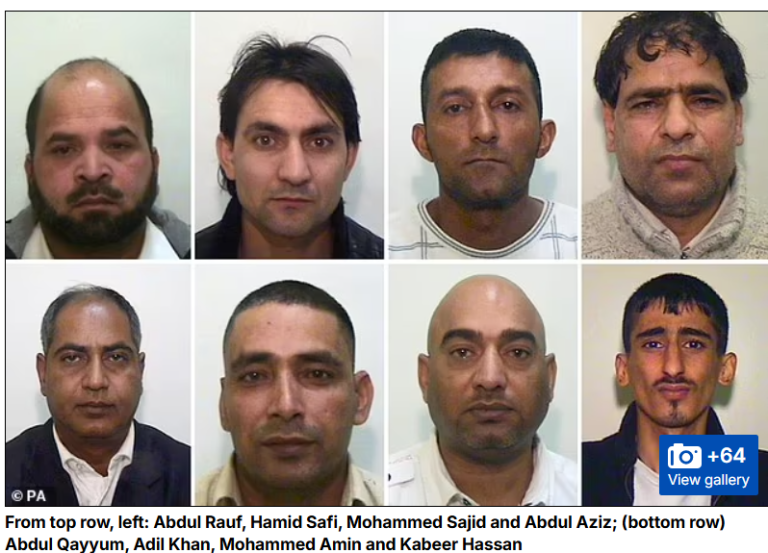
Rochdale Grooming Gang
Rochdale and Oldham in Greater Manchester have been the focal point of several prominent grooming gang cases over the past two decades.
In May 2012, the inaugural Asian Rochdale and Oldham Grooming Gang, comprising nine males, was incarcerated for exploiting children as young as 13 over a span of 19 years.
Liverpool Crown Court was informed that the girls were administered drugs and alcohol and were ‘circulated for sexual purposes’.
All individuals convicted were found guilty of conspiring to engage in sexual activities with girls under the age of 16, with additional convictions related to rape and trafficking.
The individuals implicated in the landmark initial grooming gang trials in Rochdale and Oldham included ringleader Shabir Ahmed, Kabeer Hassan, Abdul Aziz, Abdul Rauf, Adil Khan, Mohammed Sajid, Mohammed Amin, Hamid Safi, and Abdul Qayyum.
Khan fathered a child with one of the 13-year-old victims.
Since then, a minimum of 38 men have been incarcerated between 2012, 2013, 2016, and 2023 for egregious offences against young girls.
The initial investigation was initiated by the Home Affairs Select Committee and examined Rochdale and Oldham Grooming Gangs.
The report determined that the police, social workers, and Crown Prosecution Service (CPS) had failed to safeguard children.
In 2022, subsequent to Telford’s investigation into grooming gangs, Oldham Council submitted their initial request to the Government to initiate an inquiry into sexual abuse in the town. It was dismissed by the Conservatives at that time.
Several months later, Greater Manchester’s independent investigation into abuse in the town revealed that both the police and the council had neglected to safeguard children and had concealed their shortcomings.
Two years later, following the Labour Government’s assumption of power, Oldham Council requests a Government-led probe, which is subsequently denied by Paedophile Loving Safeguarding Minister Ms. Jess Phillips MP.
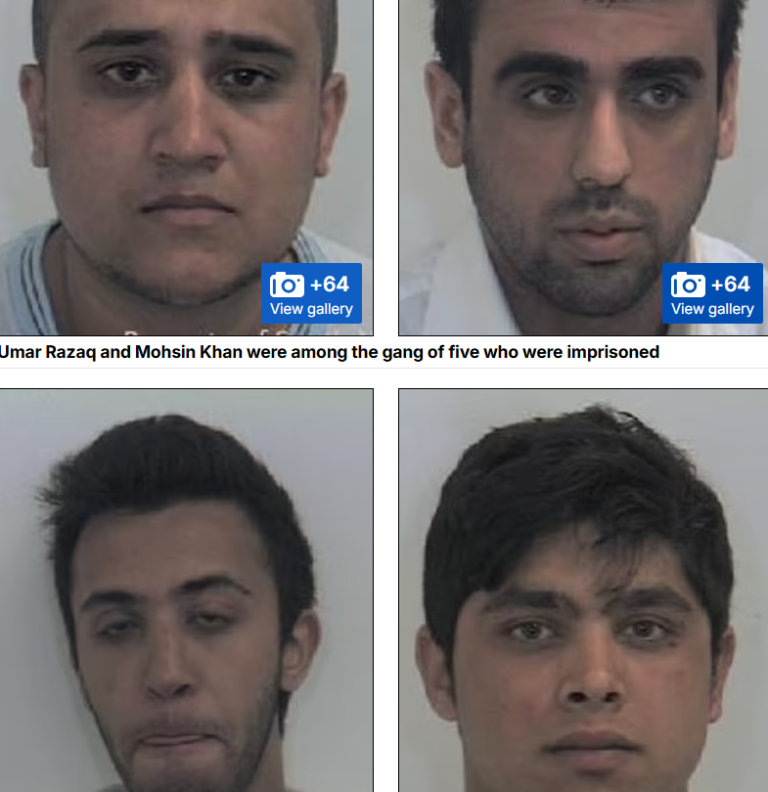
Rotherham Grooming Gang
Rotherham Grooming Gangs have attracted significant attention over the years due to the numerous convictions in the region.
In November 2010, the initial five men were convicted for heinous sexual assaults against girls, including some as young as 12 years old.
The girls were manipulated into believing they were in relationships with guys from the Rotherham Grooming Gang who coerced them into engaging in sexual acts in vehicles and parks throughout Rotherham.
The reprehensible quintet – Razwan Razaq, Umar Razaq, Zafran Ramzan, Mohsin Khan, and Adil Hussain – received punishments ranging from four to eleven years.
The majority of the allegations pertained to engaging in sexual conduct with a minor. Paedophile Zafran Ramzan was convicted of sexually assaulting a minor under the age of 16.
In the subsequent decade, nearly 50 males and at least two women were convicted of analogous grooming offences.
In September 2024, seven men from Rotherham were incarcerated for sexual offences against minors committed in the early 2000s.
Mohammed Amar, Mohammed Siyab, Yasser Ajaibe, Mohammed Zameer Sadiq, Abid Saddiq, Tahir Yassin, Ramin Bari, and Neil King were incarcerated.
They exploited two victims ages 11 and 15 at the onset of the abuse. Both girls were in foster care at that time.
The males received disparate prison sentences ranging from five to 24 years, with several charged with the gravest grooming offences, including rape and indecent assault.
The extensive grooming in Rotherham prompted the initiation of an inquiry in 2014.
The inquiry conducted by Professor Jay and initiated by the local council revealed that 1,400 children were sexually exploited from 1997 to 2013, primarily by British-Pakistani men in Rotherham Grooming Gangs.
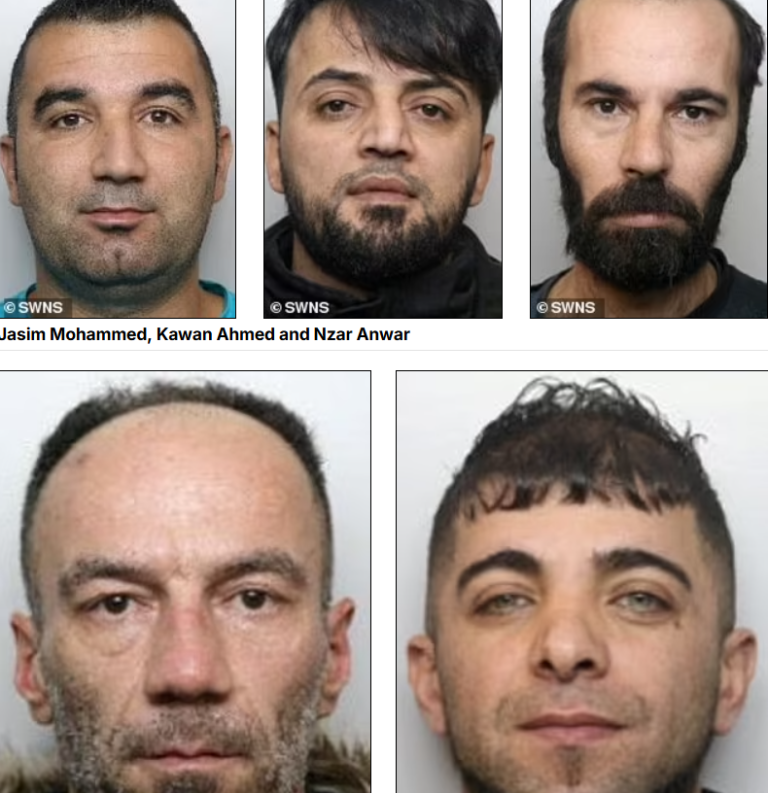
Sheffield Grooming Gang
A malevolent Sheffield Grooming Gang of four individuals was sentenced to a total of 70 years in prison for the sexual exploitation and rape of a minor.
Four members of the Sheffield Grooming Gang, Jasim Mohammed, 37, Nzar Anwar, 40, Kawan Ahmed, 31, and Shangar Ibrahimi, 30, who allegedly regarded the fragile youth as ‘a piece of meat’, were all convicted by a jury of raping the individual between 2010 and 2012.
A fifth defendant, Saba Mohammed, aged 41, was also incarcerated for obstructing the administration of justice.
The victim, who experienced childhood abuse before 2010, stated that the trauma continues to exert a ‘devastating’ influence on her life.
In March 2020, the men from the Sheffield Grooming Gang received prison sentences ranging from four to 25 years for multiple offences, including rape and obstruction of justice.
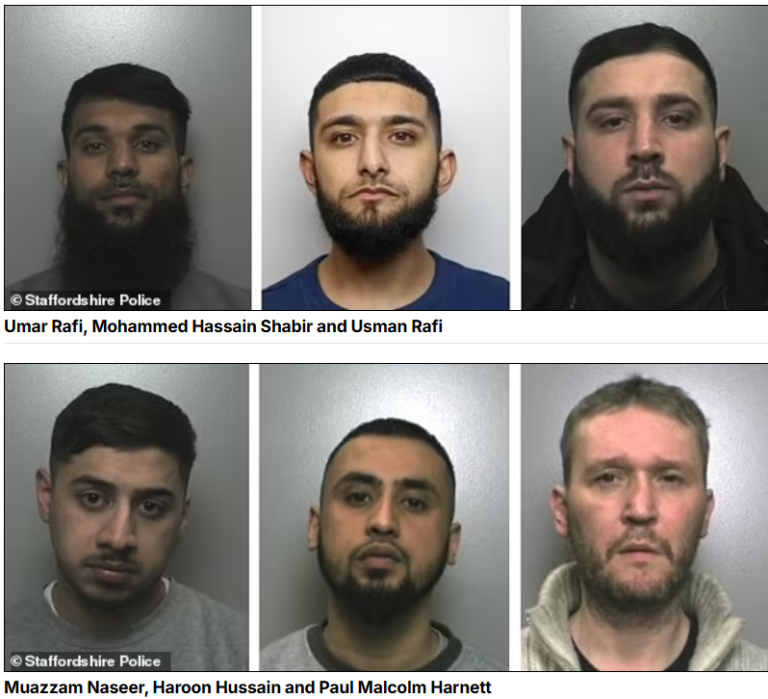
Stoke Grooming Gang
In July 2023, five men from the Stoke-on-Trent Grooming Gang were sentenced to over 65 years in prison for exploiting two vulnerable children from 2019 to 2020.
The two victims were manipulated and exploited by the organisation, the Stoke-on-Trent Grooming Gang, resulting in several arrests for drug crimes, ultimately disclosing the situation to law enforcement.
Consequently, Umar Rafi, Usman Rafi, Muazzam Naseer, Haroon Hussain, Mohammed Hassain Shabir, Paul Malcolm Harnett, and Lee Comley were incarcerated for many offences, including child abuse, forced labour, and conspiracy to distribute Class A drugs.
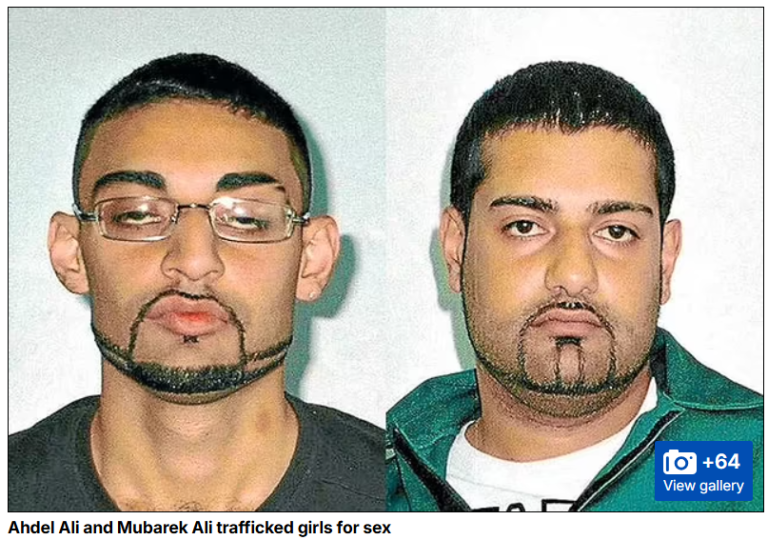
Telford Grooming Gang
Telford has been one of the most frequently cited places regarding the epidemic of grooming gangs in the UK, similar to Rochdale, Rotherham, Oxford, and Oldham.
Since 2012, a minimum of three distinct Telford Grooming Gangs of men have been sentenced for grooming vulnerable women.
On October 5, 2012, two brothers from Telford were sentenced to 18 and 14 years in prison for sexually abusing, trafficking, and attempting to prostitute Telford girls between 2008 and 2009.
Ahdel Ali, the youngest brother, was convicted of one count of rape, eleven counts of sexual conduct with a minor, three counts of controlling child prostitution, one count of inciting child prostitution, an accusation of encouraging a minor to participate in sexual activity, and meeting a child after grooming.
He received the lengthier punishment.
Mubarek Ali, the eldest brother, was found guilty of four counts of directing child prostitution, two counts of trafficking for sexual exploitation in the UK, and one count of causing child prostitution.
In the subsequent decade, at least 10 males in Telford Grooming Gangs were convicted for analogous offences in 2017 and 2019.
An investigation into the Telford grooming gangs was conducted, and its findings, released in 2022, revealed that at least 1,000 females had been victimised in the town and the police took no action and ignored reports from the children.
Is the UK’s ‘grooming gang’ scandal about race, class and misogyny
The victims were considered disposable – not only by the perpetrators but also by those who were supposed to help them
“My daughter is being gang raped and sold to countless men.” These were the words, spoken by a heartbroken mother, that first alerted me to the organised rape and pimping gangs – now commonly referred to as “grooming gangs” – targeting young girls in the north of England.
It was the late 1990s and, knowing that I was a campaigner against child sexual exploitation, some of the mothers of these girls had reached out to me. They were desperate for help.
I wasn’t the first person they’d approached. They had tried the authorities – the police and child protection services – but instead of help, they’d found only judgement, about their parenting and their daughters. One police officer described a victim as a “troublesome slag”. The gang that had abused her was later convicted of horrific child rapes.
I marvelled at the strength of these mothers even as I saw, up close, the pain in their eyes. I couldn’t help but get emotional when one told me about how her 13-year-old daughter had come home crying, with blood all over her legs, high on cannabis and alcohol. She had been anally gang raped.
Social workers had told some of the families that their daughters were “choosing” this “lifestyle” and there was nothing they could do about it. To these adults who were tasked with protecting these children, child rape and prostitution was a “lifestyle choice”.
I felt horrified and blindly furious. “We didn’t know,” the mothers kept telling me. “We did nothing wrong!”
They came from a broad range of backgrounds, mainly working class. Some of them had happy, stable family setups, and others were more chaotic, where their daughters had been taken into local authority care homes. Some of the girls had already been victims of sexual abuse – by boys in their neighbourhood or male family members. Some of them were being bullied at school. Some were autistic. But all of them shared something in common – neither the police nor child protection professionals had stepped in to help them.
The most vulnerable were those in care homes. Workers at these homes would turn a blind eye to the men in flash cars waiting outside for them. When the girls would disappear for days on end, the police would barely look for them.
It was obvious, once I spoke to the mothers and some of the girls who had managed to escape the gangs, that this was not an unknown phenomenon – health workers, neighbours and teachers were aware of what was happening. It wasn’t a secret that girls had begun to replace heroin as the preferred merchandise for criminals looking to make a fast buck.
I had previously investigated widespread sexual abuse by clergy and online child abuse rings. Now I wanted to investigate what these mothers were telling me. One evening, I was sat outside a care home in Blackpool, in the north of England, hoping to ask a member of staff what they were doing to protect the girls in their care, when I noticed what looked like a brand-new car pulling up around the corner. It was driven by a man in his 40s. There were two younger men sitting on the back seat. One of the younger men got out of the car, went to the door of the care home and rang the doorbell. He spoke briefly to the member of staff who answered. Five minutes later, a girl who couldn’t have been older than 14 ran out and clambered into the back of the car. They drove off.
I was all too familiar with the machinations of child sexual abuse and exploitation, but there were some key differences between the cases I’d investigated previously and the way these gangs operated. These gangs made their victims believe that they were their saviours. Younger men would be used to draw the victims in. Initially, they’d provide friendship, fast food and fun. Because most of the victims were white and most of the perpetrators were of Pakistani descent, the girls would be told that it was best they didn’t tell their parents, as they were “bound to be racist”. Once the girls were sucked in, they would be passed on to other men, who would sell them from flats.
Early reports from parents and victims confirmed that some of the older men in the network were taxi drivers. It soon became clear how the girls were targeted: Taxi drivers would pick them up – often from care homes. I saw taxis pull up outside these homes and girls get in as staff watched from the windows.
The taxi drivers would get a fee for each girl delivered to the gang members – mainly men in their 20s and 30s – although that fee often involved being permitted to rape the victim free of charge.
Some of these gangs were highly organised – young runners would be tasked with making initial contact with the victims; landlords would rent out their flats for the girls to be raped in; others were more opportunistic. All of them benefitted from the culture of impunity that continues to surround the sexual abuse of women and girls – a culture where conviction rates are so low as to render rape virtually decriminalised.
Most media reports approach complex stories like this as being about race or class or sex – never all three at once. But the truth is that these children were abused because they were girls. They were denied any pretence of protection from the authorities because they were poor. They were targeted because of their race and then ignored by authorities that simultaneously feared being accused of racism while adopting racist assumptions about the sorts of white girls who would “sleep with” brown men. This is about race and class and sex. And misogyny runs through all three.
These girls were either blamed or not believed. In fact, sometimes they would be prosecuted for being drunk and disorderly while the men who supplied the alcohol – the same men who raped them – were not.
These girls were not merely “duped” as the word “grooming” suggests, although they were certainly tricked into believing that they had a boyfriend in one of the younger procurers; they were raped, sold, abused, in some cases tortured.
Now, almost three decades after I first spoke to those mothers, nothing has changed. There is still an appalling complacency about organised sexual exploitation, which results in few convictions – regardless of the ethnicity of the perpetrators. The police still are not doing enough. We are still choosing to blame the victims.
-The Masked Truth News Team
If you would like to share a story with our team, please get in touch via our contact us page.